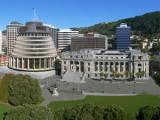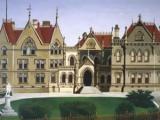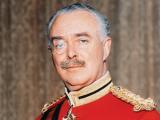Robert FitzRoy, the second governor of New Zealand (1843-45), took his own life at his home near London. Opinion on his governorship has always been divided.
Governor
Events In History
During his first term as governor, George Grey was praised for ending the Northern War and obtaining land from Māori, but he angered settlers by delaying the implementation of a constitution that would have given them some political power.
Articles
Notes for My Successor

Until the late 1960s New Zealand's governors-general were British, mainly minor aristocrats, or admirals or generals. Read the full article
Page 4 - Staff and servants
Lord Bledisloe (1930–35) felt that senior staff 'should be fond of dancing and of games and sport of all kinds, as these accomplishments appeal to people here I would not have
Page 5 - A home away from 'Home'
Government House in Wellington is a busy place. Every year it hosts about 15,000 guests at 200
Page 6 - Pay and perks and handy hints
The colonial government cut the vice-regal salary and allowances from £7500 to £5000 in the late 1880s, just when the declining British aristocracy was looking to the Empire to
Page 8 - From lieutenant-governor to governor-general
An outgoing governor-general's 'Notes for My Successor' have had their day. New Zealand governors-general already know the country and have no need to pack their household goods
The House of Representatives

New Zealand's Parliament dates back to 1854, just 14 years after the signing of the Treaty of Waitangi and the beginning of the European settlement of the country. For most of its history as a nation state, New Zealand has had some form of elected government. Read the full article
Page 3 - Parliament
Today there are two parts to Parliament – the House of Representatives (or the Lower House) and the Governor-General, but between 1854 and 1951 there was a third part, the
Parliament Buildings

Parliament buildings have been modified, destroyed by fire, half-built and restored; the parliamentary places and spaces have formed an important part of New Zealand's history. Read the full article
Page 2 - First Parliament buildings
Auckland was a bustling place in 1854 when Parliament met there for the first time. The buildings were located in paddocks on what was then the edge of town, Constitution Hill,
History of the Governor-General

New Zealand has had a governor or (from 1917) a governor-general since 1840. The work of these men and women has reflected the constitutional and political history of New Zealand in many ways. Read the full article
Page 1 - History of the governor-general
New Zealand has had a governor or (from 1917) a governor-general since 1840. The work of these men and women has reflected the constitutional and political history of New Zealand
Page 2 - Modern duties
The governor-general's duties are divided into three functions: ceremonial, community and
Page 3 - Crown colony era
New Zealand became a British colony in 1840, legitimised by the Treaty of Waitangi and Lieutenant-Governor William Hobson's 21 May declaration of
Page 4 - Responsible government
From the 1840s settlers demanded a say in government. Governor George Grey suspended an overly elaborate constitution in 1846, but the New Zealand Constitution Act 1852 gave male
Page 5 - Splendid ornamentals
With the appointment of Lord Onslow in 1889, a new type of governor took up residence in Government
Governors and Governors-General

New Zealand has had 16 resident governors and 22 governors-general. Two early governors were called governor-in-chief. Read the full article
Page 1 - Governors and governors-general
New Zealand has had 16 resident governors and 22 governors-general. Two early governors were called
Page 2 - Selection process
In the days of the Empire, the British government appointed New Zealand's governors and governors-general. New Zealand had no say.
Page 3 - Career paths
As the job evolved over time, so did the type of person needed to govern successfully. Between 1840 and 1853, when governors ruled personally, they were junior navy or army
Page 4 - Genes, gender and age
From 1840 until 1972, New Zealand's governors and governors-general were

























